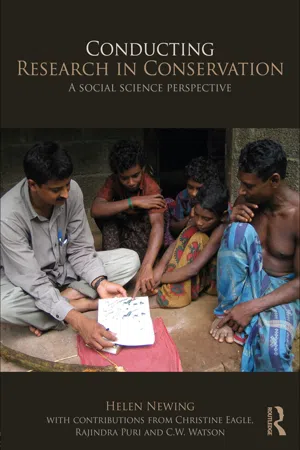
Conducting Research in Conservation
Social Science Methods and Practice
Helen Newing
- 378 Seiten
- English
- ePUB (handyfreundlich)
- Über iOS und Android verfügbar
Conducting Research in Conservation
Social Science Methods and Practice
Helen Newing
Über dieses Buch
Conducting Research in Conservation is the first textbook on social science research methods written specifically for use in the expanding and increasingly multidisciplinary field of environmental conservation.
The first section on planning a research project includes chapters on the need for social science research in conservation, defining a research topic, methodology, and sampling. Section two focuses on practical issues in carrying out fieldwork with local communities, from fieldwork preparation and data collection to the relationships between the researcher and the study community. Section three provides an in-depth focus on a range of social science methods including standard qualitative and quantitative methods such as participant observation, interviewing and questionnaires, and more advanced methods, such as ethnobiological methods for documenting local environmental knowledge and change, and participatory methods such as the 'PRA' toolbox. Section four then demonstrates how to analyze social science data qualitatively and quantitatively; and the final section outlines the writing-up process and what should happen after the end of the formal research project.
This book is a comprehensive and accessible guide to social science research methods for students of conservation related subjects and practitioners trained in the natural sciences. It features practical worldwide examples of conservation-related research in different ecosystems such as forests; grasslands; marine and riverine systems; and farmland. Boxes provide definitions of key terms, practical tips, and brief narratives from students and practitioners describe the practical issues that they have faced in the field.
Häufig gestellte Fragen
Information
Appendix 1
Online survey: kitesurfing and the environment
Inhaltsverzeichnis
- Contents
- List of tables
- List of figures
- List of boxes
- Foreword
- Acknowledgements
- Section I Planning a research project
- Section II Methods
- Section III Fieldwork with local communities
- Section IV Data processing and analysis
- Section V Writing up, dissemination and follow-up
- Appendix 1 Online survey: kitesurfing and the environment
- Appendix 2 Questionnaire: community orchards
- References
- Index